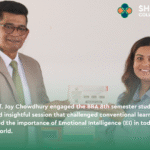The objective of the workshop on “Manager’s Perspective on Organizational Behavior,” conducted by BBA 4th semester students at Shubhashree College of Management provided participants with a practical understanding of organizational behavior from the viewpoint of a manager. The workshop aimed to bridge the gap between theoretical knowledge and real-world application, enabling attendees to grasp the intricacies faced by managers in their day-to-day roles. By engaging participants in scenarios depicting managerial challenges, the workshop aimed to create a hands-on experience, allowing attendees to witness and analyze the decision-making processes and interpersonal dynamics in a corporate setting. The workshop aimed to foster an interactive environment where attendees could share their insights, experiences, and perspectives on organizational behavior. This collaborative approach aimed to enhance the overall learning experience.
Participants gained practical insights into the application of organizational behavior concepts in managerial roles. The use of role play allowed them to witness firsthand the challenges managers face and the decision-making processes involved in navigating organizational dynamics. The workshop deepened participants’ understanding of organizational behavior beyond theoretical frameworks. By engaging in discussions and interactive sessions, attendees were able to explore various managerial perspectives, fostering a more nuanced comprehension of how behavior impacts organizational success. The role play component provided a platform for BBA 4th semester students to hone their communication skills. This included effective verbal communication, non-verbal cues, and the ability to articulate managerial decisions and strategies. Participants had the opportunity to witness and engage in practical decision-making scenarios. This hands-on experience allowed them to analyze the complexities involved in managerial decision-making, emphasizing the importance of considering various factors in organizational settings. In summary, the workshop provided a holistic learning experience by combining theoretical knowledge with practical application, fostering communication and soft skills, and creating a collaborative environment that extended beyond the confines of the classroom. It successfully bridged the gap between academia and real-world managerial challenges.









